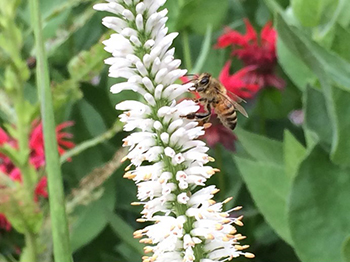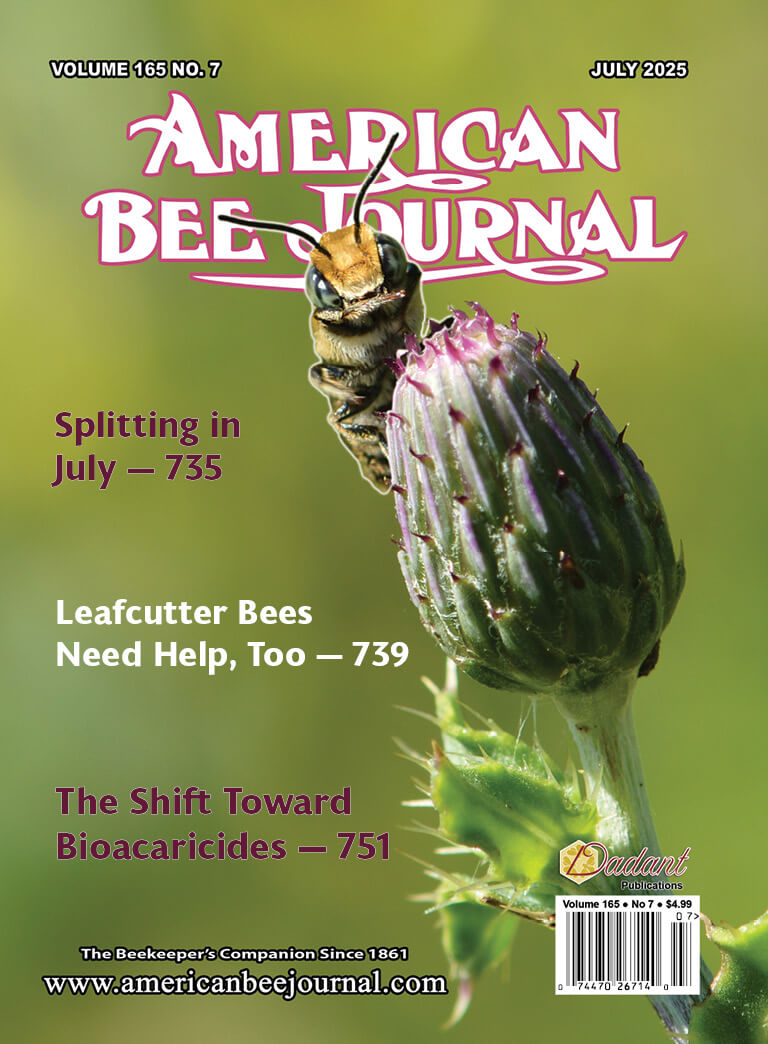
CULVERS ROOT
I took the attached photograph the other day in our wildflower meadow and wanted to share it with you. I live in the mountains of western North Carolina and the bee is on a flowering plant that I have identified as Culvers Root. The red plant in the background is Red Beebalm.
Your Truly,
Mike Elliott
Envisioning the Future of Beekeeping
Hello Kirsten Traynor,
I wanted to share with you my reaction to the article Envisioning the Future of Beekeeping part 2. I felt that its tone was offensive, criticizing the entire realm of beekeeping. The concept and practice of beekeeping has many facets, many of which are passed on through books, magazines, verbally, classroom settings, mentor to beginner, and yes, digitally. However, regardless of the type of media or format, the message is similar. There is a love for nature, our environment, insects, animals, compassion………………a desire to protect and preserve what we have, make it better, pass it along to others.
What I felt when reading the article was an attempt by segments of society to have their voice heard under the banner of Diversity, Stumbling Blocks and to criticize national, state and local beekeepers and organizations. Beekeeping and pollinator protection requires the cooperation of people and organizations of all types. We must work together. Share with each other our successes and failures, listen to each other, and use Best Practices to protect and preserve what we have, make it better, pass it along to others. Let’s focus on the joy of beekeeping and seeing others to find joy.
I am a member of the McDowell county NC Honey Bees. We are a club supported by our local extension service. We have an annual bee school for beginning beekeepers, provide training to become Certified Beekeepers, have a youth position on our board of directors, welcome people of all genders, races and ages as members, put on education for our local schools, put on programs to educate non-beekeepers of the importance of pollinators, many of the things that the article pointed out that need to be a part of beekeeping. Counties adjacent to us have similar clubs. Asheville was the first Beekeeper USA city.
So, perhaps, in Part 3, maybe the article can mention some of the good things about beekeeping and protecting the pollinators.
Sincerely,
Lonnie Bewernitz
Response from Michele
Dear Lonnie Bewernitz,
Thank you for your comments in response to the second in our three part series of “Envisioning the Future of Beekeeping.” The article consisted of interviews with 12 beekeepers across the USA. Ms. Potter and I simply compiled their concerns and hopes into these brief articles. To keep the discussion going we have a Forum page on the Pollinator Stewardship Council Facebook page for other beekeepers to share their issues, concerns, ideas, and solutions to improving the health of our honey bees and the beekeeping industry.
What we found in the interviews with these 12 beekeepers was not all of the states have active and strong state and local beekeeping associations like those in North Carolina. The beekeepers we interviewed believe in protecting all pollinators, and are deeply concerned with the ecosystem of our bees and beekeepers. I hope this comes through in the….


